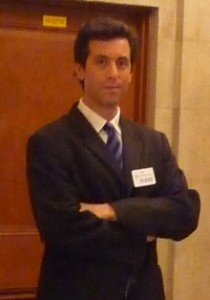 Matthew Freedman, a ’99 HLS grad and former president of ELS, has a long and proven track record of furthering environmental law initiatives. Prior to enrolling at HLS, he spent years working with organizations like Public Citizen and MassPIRG on electricity policy and air pollution, and he continued working on these issues while at HLS. Freedman found that continuing to work with outside organizations was just as important, if not more so, than taking classes, because it enabled him to stay connected to the issues and use law school resources to respond to real-world problems. For instance, he credits Antitrust Professor Judge Michael Boudin with helping him phrase language for a proposed legislative amendment to prevent the excessive concentration of old power plants among only a few leading companies, and professors Duncan Kennedy and John Hanson for teaching him how to deconstruct the “rule of law” and flip a legal argument to support his own policy goals.
Matthew Freedman, a ’99 HLS grad and former president of ELS, has a long and proven track record of furthering environmental law initiatives. Prior to enrolling at HLS, he spent years working with organizations like Public Citizen and MassPIRG on electricity policy and air pollution, and he continued working on these issues while at HLS. Freedman found that continuing to work with outside organizations was just as important, if not more so, than taking classes, because it enabled him to stay connected to the issues and use law school resources to respond to real-world problems. For instance, he credits Antitrust Professor Judge Michael Boudin with helping him phrase language for a proposed legislative amendment to prevent the excessive concentration of old power plants among only a few leading companies, and professors Duncan Kennedy and John Hanson for teaching him how to deconstruct the “rule of law” and flip a legal argument to support his own policy goals.
Upon graduating, Freedman spent four months traveling across Southeast Asia before becoming a staff attorney at The Utility Reform Network (TURN), a San Francisco-based consumer advocacy organization where he still works today. At TURN, Freedman loves using law, policy, economics, science, and consumer preferences to fuel discussions and argue for public interest outcomes. This, combined with a relatively collegial atmosphere—in contrast to the typical civil litigation mentality prevalent in much of the legal world—allows Freedman to focus on substantive issues rather than fighting endless discovery battles or devoting his time to procedural motions. Freedman’s signature achievement at TURN thus far has been serving as the key architect behind California’s Renewables Portfolio Standard, a landmark statute which requires utilities to purchase 33 percent of their electricity from renewable resources by 2020 (up from 20% today).
For current HLS students hoping to pursue a career in environmental law, Freedman suggests students explore their interests and passions even if it requires extra initiative and a bit of entrepreneurialism. He also advocates the “try before you buy” approach: taking the time to get experience in a particular area during law school, either through internships, volunteer projects, or clinical placements. In addition to gaining experience and developing a network, students can use these opportunities to improve their work quality and learn how to present themselves to future employers. Ultimately, while grades may feel like the be-all and end-all, Freedman advises students to devote more time to developing their future careers and less time to all-night study sessions at Langdell.